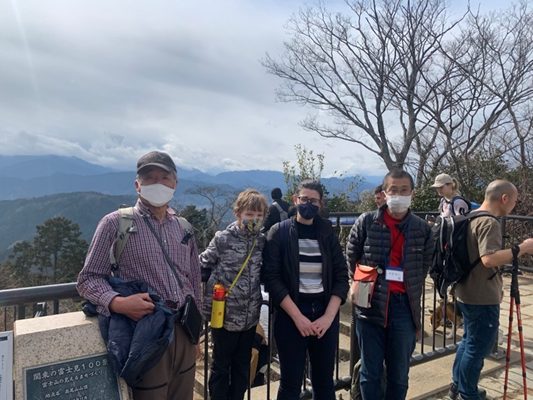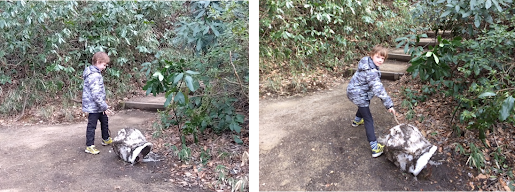Our guests today were a mother and son from New Zealand who live in Tokyo. Tengu guides were Nosan, Ken and Maki. We started the tour at 10:30 from Takaosanguchi Station. Although it was cloudy, the weather was nice for hiking since it was windless and warm.
1, Cable Car
From Kiyotaki Station, we took a cable car to Takaosan Station. This cable car has the steepest slope in Japan, with a maximum slope of about 31 degrees.
2, Mt. Takao Beer Mount Observatory
We took in the view from the observatory of "Mt. Takao Beer Mount" which is the highest beer garden in Tokyo. Although we couldn't see the Sky Tree, the view was fabulous.
From here we walked to the summit
3, Rokkon Shojo,
Ishiguruma
The 8-year-old guest was particularly interested in
Rokkon Shojo Ishiguruma, stone wheels for purification of the six roots. He was
not allowed to rotate the stone wheels because of Covid-19 but had fun. He was attending
Japanese elementary school and studying kanji, so he tested himself to see if
he could read the kanji which was engraved on the stone sphere put on top of each
Ishiguruma The one in the photo is with a kanji that means nose.
.
The six roots are the basis of human cognition; the eyes, ears, nose, tongue, and body, together
with the intention (mind) to properly use each of them.
If the six roots are
covered in attachments such as egoism, you will not be able to go on the right
path. Therefore, it is important to cut off attachments and keep your mind
pure. There are 3 sets of 6 types of stone wheels on in the mountain for a
total of 18 stone wheels. By rotating each one six times it totals 108
rotations which is the same number of human earthly desires.
4, Oni Couple
at Shinpendo
After passing the octopus cedar, you will see a temple gate in front of you. This is a gate called Jyoshinmon, and it indicates that it is the precincts of Yakuo-in Temple, and a sacred area starts from here. The plaque reading Reikimanzan is hung on the Joshinmon Gate. It means “mountain filled with spiritual energy” and indicates that this place is the center of mountain worship.
Immediately to the left is Shinpendo, which enshrines En no Gyoja (634-707), who is said to be the founder of Shugendo. Here, we prayed for our physical and mental health.
Shugendo is a mixed religion that combines elements of Shinto and Buddhism with the beliefs of indigenous animism and the practice of shamanism. Known as Shugenja or Yamabushi, its followers blow conch shell trumpets that echo in the forest and engage in hard training. It is still practiced on Japan's most sacred mountains, such as Mt. Takao
One of today's two
guests, the mother of an 8-year-old child, asked why a couple of oni
(ogre/demon), apprentices of En no Gyoja, were holding an axe and a bottle.
This is the answer:
Zendōki (male, left) was always
walking ahead of En no Gyoja, advancing through deeply forested mountains with
an iron axe. Zendōki 's wife Myodōki (female, right) also helped En no
Gyoja by always carrying a water bottle filled with Risui (water with spiritual
power).
5, Eight Golden Dragon King
Our 8-year-old guest ate
goma-dango (sesame dumplings) grilled over charcoal at Gongen Chaya tea
house. to refuel. He said it was yummy!
He washed his mother’s coins very carefully at the Eight Golden Dragon King Statue. It is said that if you wash your money with the water that springs from its feet and spend it, you will be blessed with good fortune and prosperous business.
We passed Yakuo-in
Temple, where we could hear the sutras of the Goma-kito (fire ritual), Izuna- Gongen-do Hall with impressive
colorful reliefs on the exterior walls, and Sengen Shrine where Mt. Fuji
is worshiped. Then we walked along the mountain path towards our destination,
the summit of Mt. Takao.
6, Summit of Mt. Takao
At around 13:00 we reached the summit at an altitude of 599mMt. Fuji was covered by clouds, but we were satisfied with our accomplishment. And we chatted happily while we ate lunch which each brought.
On the summit there were still patches of snow that had not melted since February 11th.
We took a different
route back to Kiyotaki Station, where we left in the morning.
On the way back, instead
of Trail 1, we took Trail 4 and crossed Miyama suspension bridge. Trail
4 allows you to fully enjoy the nature of the mountains. Most of Trail 4 was
narrow and wet due to last week's snow, so we were careful not to slip.
We took the lift
instead of the cable car. We felt the refreshing breeze of Mt. Takao with our
whole bodies more than we did on the cable car.
We arrived at Kiyotaki
Station at around 15:30.
After the tour, Nosan
took the guests to TAKAO 599 Museum, which showcased the flora, fauna
and trails of Mount Takao.
Written by Maki











0 件のコメント:
コメントを投稿